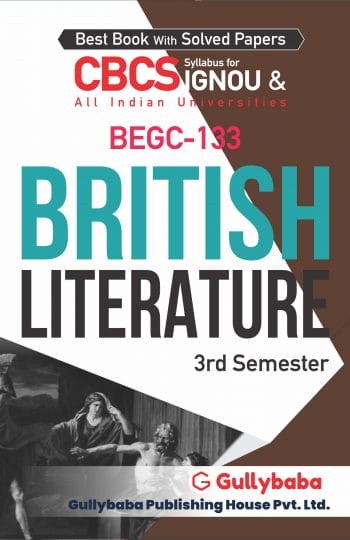IGNOU BEGC-133 (July 2023 - January 2024) Assignment Questions
SECTION A
I Explain the following passages with reference to the context.
1. “I have no spur
To prick the sides of my intent, but only
Vaulting ambition, which o’erleaps itself
And falls on th’ other.”
2. “Out, damned spot: out I say! One, Two: Why then ’tis time
to do’t. Hell is murky. Fie, My Lord, fie! A soldier, and
affear’d? What need we fear who knows it, when none can
call our power to accompt”?
3. “He did it like an operatic tenor—a regular handsome fellow, with
flashing eyes and lovely moustache, shouting a war-cry and charging
like Don Quixote at the windmills. We nearly burst with laughter at
him; but when the sergeant ran up as white as a sheet, and told us
they’d sent us the wrong cartridges, and that we couldn’t fire a shot
for the next ten minutes, we laughed at the other side of mouths.”
4. “The old order changeth, yielding place to new,
And God fulfils himself in many ways,
Lest one good custom should corrupt the world.
Comfort thyself: what comfort is in me?
I have lived my life, and that which I have done
May He within himself make pure!”
Section B
II. Write short notes on the following:
a. Characterisation in Far from the Madding Crowd.
b. The ‘Banquet Scene’ in Macbeth.
c. Tennyson as a representative poet of Victorian England.
d. Bernard Shaw and the ‘discussion play’.
III. Write short essays on the following:
a. “Arms and the Man is considered to be an ‘anti-romantic comedy’”. Do you agree?
b. What are the main themes of Tennyson’s poem “Morte d’Arthur’? Briefly explain the allegorical significance of the poem.
Section C
IV Write a brief critical appreciation of Thomas Hardy’s novel Far from the Madding Crowd, bringing out the significance of the landscape of Wessex in the novel.
IGNOU BEGC-133 (July 2022 - January 2023) Assignment Questions
SECTION A
I. Explain the following passages with reference to the context.
1. “Stay, you imperfect speakers, tell me more.
By Sinel’s death I know I am Thane of Glamis;
But how of Cawdor? The Thane of Cawdor lives,
A prosperous gentleman; and to be king stands not within the
prospect of belief,
No more than to be Cawdor. Say from whence
You owe this strange intelligence? Or why
Upon this blasted heath you stop our way
With such prophetic greeting.”
2. “Is this a dagger which I see before me,
The handle toward my hand? Come, let me clutch thee: -
I have thee not, and yet I see thee still.
Art thou not, fatal vision, sensible
To feeling as to sight? Or art thou but
A dagger of the mind? A false creation,
Proceeding from the heat-oppressed brain?”
3. “How strange it is to be talked to in such a way! You know, I’ve
always gone on like that. I mean the noble attitude and the thrilling
voice. I did it when I was a tiny child to my nurse. She believed in
it. I do it before my parents. They believe in it.”
4. “The old order changeth, yielding place to new,
And God fulfils himself in many ways,
Lest one good custom should corrupt the world.
Comfort thyself: what comfort is in me?
I have lived my life, and that which I have done
May He within himself make pure!”
Section B
II. Write short notes on the following:
a. Thomas Hardy and the fictional region of Wessex.
b. Hardy’s classification of his own novels.
c. The ‘Porter Scene’ in Macbeth.
d. Tennyson as a representative poet of Victorian England.
III. Write short essays on the following:
a. Justify the title of Bernard Shaw’s play Arms and the Man.
b. Explain the significance of the symbols employed in ‘Morte d’Arthur’.
Section C
IV Discuss Hardy’s approach to the natural world, as expressed in Far from the Madding Crowd.
Buy BEGC-133 Assignment 